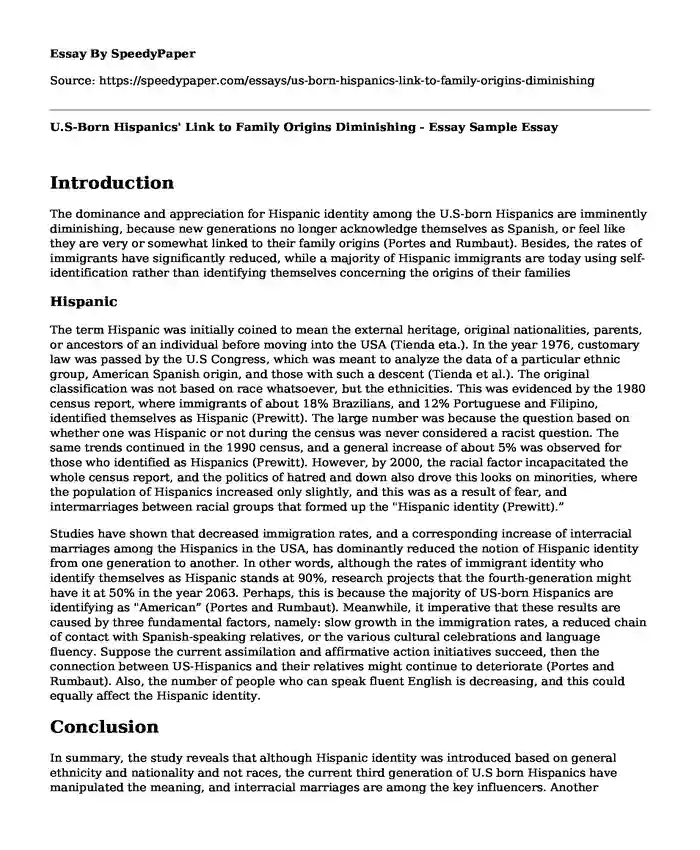
| Type of paper: | Essay |
| Categories: | United States Family |
| Pages: | 3 |
| Wordcount: | 586 words |
Introduction
The dominance and appreciation for Hispanic identity among the U.S-born Hispanics are imminently diminishing, because new generations no longer acknowledge themselves as Spanish, or feel like they are very or somewhat linked to their family origins (Portes and Rumbaut). Besides, the rates of immigrants have significantly reduced, while a majority of Hispanic immigrants are today using self-identification rather than identifying themselves concerning the origins of their families
Hispanic
The term Hispanic was initially coined to mean the external heritage, original nationalities, parents, or ancestors of an individual before moving into the USA (Tienda eta.). In the year 1976, customary law was passed by the U.S Congress, which was meant to analyze the data of a particular ethnic group, American Spanish origin, and those with such a descent (Tienda et al.). The original classification was not based on race whatsoever, but the ethnicities. This was evidenced by the 1980 census report, where immigrants of about 18% Brazilians, and 12% Portuguese and Filipino, identified themselves as Hispanic (Prewitt). The large number was because the question based on whether one was Hispanic or not during the census was never considered a racist question. The same trends continued in the 1990 census, and a general increase of about 5% was observed for those who identified as Hispanics (Prewitt). However, by 2000, the racial factor incapacitated the whole census report, and the politics of hatred and down also drove this looks on minorities, where the population of Hispanics increased only slightly, and this was as a result of fear, and intermarriages between racial groups that formed up the "Hispanic identity (Prewitt).”
Studies have shown that decreased immigration rates, and a corresponding increase of interracial marriages among the Hispanics in the USA, has dominantly reduced the notion of Hispanic identity from one generation to another. In other words, although the rates of immigrant identity who identify themselves as Hispanic stands at 90%, research projects that the fourth-generation might have it at 50% in the year 2063. Perhaps, this is because the majority of US-born Hispanics are identifying as "American” (Portes and Rumbaut). Meanwhile, it imperative that these results are caused by three fundamental factors, namely: slow growth in the immigration rates, a reduced chain of contact with Spanish-speaking relatives, or the various cultural celebrations and language fluency. Suppose the current assimilation and affirmative action initiatives succeed, then the connection between US-Hispanics and their relatives might continue to deteriorate (Portes and Rumbaut). Also, the number of people who can speak fluent English is decreasing, and this could equally affect the Hispanic identity.
Conclusion
In summary, the study reveals that although Hispanic identity was introduced based on general ethnicity and nationality and not races, the current third generation of U.S born Hispanics have manipulated the meaning, and interracial marriages are among the key influencers. Another challenge that impacts Hispanic identity in the USA is the fear of mistreatment as a minority group. Political instabilities in the USA also motivates the majority of Hispanics to identify themselves as Americans.
Works Cited
Tienda, Marta, Faith Mitchell, And National Research Council (US) Panel On Hispanics In The United States. "Defining Hispanicity: E Pluribus Unum Or E Pluribus Plures?." Multiple Origins, Uncertain Destinies: Hispanics And The American Future. National Academies Press (US), 2006.
Prewitt, Kenneth. "Beyond Census 2000: As A Nation, We Are The World." Carnegie Reporter, Vol 1, No.3, 2001, Pp. 3-11.
Portes, Alejandro, And Rubén G. Rumbaut. "Defining The Situation: The Ethnic Identities Of Children Of Immigrants." Legacies: The Story Of The Immigrant Second Generation, 2001, Pp. 147-191.
Cite this page
U.S-Born Hispanics' Link to Family Origins Diminishing - Essay Sample. (2023, Sep 15). Retrieved from https://speedypaper.net/essays/us-born-hispanics-link-to-family-origins-diminishing
Request Removal
If you are the original author of this essay and no longer wish to have it published on the SpeedyPaper website, please click below to request its removal:
- Free Essay Sample. State Judges
- Paper Example on Story of The SS St Louis Ship
- Dark Chapter of US History: The Tuskegee Syphilis Study - Essay Sample
- Annotated Bibliography: Exploring Concepts from Autism to Respiratory Syncytial Virus
- Free Report on Navigating Aging: Societal Perspectives and Health Realities
- Pediatric Health: Assessments and Conditions Overview - Report Sample
- Paper Sample on Biden's Healthcare Proposal
Popular categories




